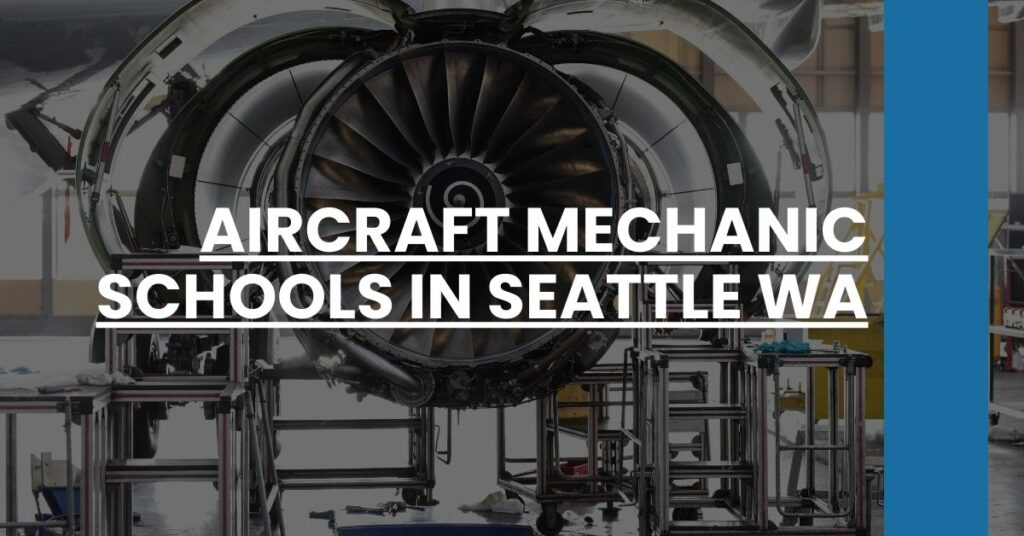Not in Seattle? Check out our lists of Aircraft Mechanic Schools in Bellevue, Everett, Federal Way, Kent, Renton, Spokane Valley, Spokane, Tacoma, Vancouver, and across Washington.
Wondering where to start your career as an aircraft mechanic in Seattle? We’ve got you covered.
This guide highlights the top Aircraft Mechanic Schools in Seattle WA, detailing their programs, unique features, and how they can help you succeed in aviation maintenance.
Explore your options and find the best fit for your future in aircraft mechanics.
South Seattle College – Aviation Maintenance Program
The Aviation Maintenance Program at South Seattle College offers a robust curriculum over 8 quarters. It is structured to equip you with both theoretical and practical skills necessary for attaining an FAA Airframe and Powerplant license.
Key program features:
- Curriculum: Covers a wide range of topics including aircraft terminology, maintenance records, Federal Aviation Regulations (FARs), and shop safety practices.
- Hands-on training: Includes maintenance of various aircraft structures and engines, both reciprocating and gas turbine.
- Materials: Focuses on materials such as composites, fiberglass, and metals.
- Academic Requirements: Requires 147 credits for completion.
- Fees: Involves costs for textbooks, aviation lab materials, and FAA licensing exams.
Classes are available in both full-time and part-time options, making it flexible for your schedule. To get started, you need to pass a placement test and consult an advisor. This program is your first step towards a career as an aircraft mechanic, airframe and powerplant mechanic, or helicopter maintenance technician.
South Seattle College – Aeronautical Technology Associate of Applied Science (AAS) Degree Program
The Aeronautical Technology AAS Degree Program at South Seattle College is designed for those who want to explore advanced aircraft maintenance technologies. This program is suitable for graduates of accredited airframe and powerplant programs or experienced FAA-certified mechanics.
Key program aspects:
- Core Studies: Includes aircraft terminology, physics, maintenance documentation, FARs, and various materials used in aircraft.
- Specialized Knowledge: Focuses on powerplant theory, maintenance, and inspection procedures.
- Career Outcomes: Prepares you for roles such as aircraft mechanic, helicopter maintenance technician, and aviation R&D engineer.
You must meet with an advisor and may need to take placement tests to ensure readiness. The program aligns with industry standards and includes experienced faculty to guide you.
North Seattle College – Avionics Technician Certificate
The Avionics Technician Certificate at North Seattle College is ideal for those keen on aviation electronics. You can enter this program if you have completed the Basic Electricity for Aviation course or possess an FAA Airframe License.
Program highlights:
- Main Courses: “Introduction to Aviation Electronics,” and “Introduction to Robotics.”
- Skills Developed: Basic wiring, termination, and foundational robotic programming.
- Flexible Schedule: One-quarter full-time or two-quarter part-time options with hybrid and evening courses.
- Cost: Varies based on residency status.
Upon completing this program, you will be prepared for roles such as Aircraft Electrical Systems Specialist and Avionics Installer. Detailed program lengths and costs require consultation with an advisor for the latest information.
Clover Park Technical College – Aviation Maintenance Technician Program
Clover Park Technical College (CPTC) in Lakewood, WA offers an extensive Aviation Maintenance Technician Program. This program provides both hands-on and theoretical training under the guidance of industry veterans, including instructors with over 40 years of experience. Here’s what the program offers:
- Program Tracks: Various options like the AAT & AAS-T Degree, Airframe Maintenance Technician Certificate, and Powerplant Technician Certificate, with durations ranging from 5 to 8 quarters.
- Skills Training: Focused on structure repairs, systems troubleshooting, Federal Aviation Regulations (FARs), teamwork, and personal accountability.
- Career Preparation: Equips you to work on commercial and private aircraft, with potential roles such as Aviation Maintenance Technician.
CPTC also holds information sessions to provide insights into the curriculum and industry expectations. The program ensures you gain the necessary skills to succeed in the aviation maintenance industry.
How to Choose the Right Aircraft Mechanic School
Choosing among the Aircraft Mechanic Schools in Seattle WA requires careful consideration. Here are some factors to help you make the right choice:
- Accreditation: Ensure the school is accredited and meets industry standards.
- Curriculum: Look for a comprehensive mix of theoretical knowledge and hands-on training.
- Facilities and Equipment: Choose a school with up-to-date equipment and facilities that reflect industry standards.
- Experienced Faculty: Instructors with real-world experience provide invaluable insights and practical knowledge.
- Job Placement Assistance: Schools that offer job placement services can significantly impact your employability.
- Networking Opportunities: Institutions with strong industry connections can open doors for you.
- Financial Considerations: Evaluate tuition fees and the availability of financial aid or scholarships.
- Campus Visit: Visit the school, interact with faculty and current students, and review alumni success stories.
Balancing these factors will help you find the right educational institution that aligns with your career goals.
Conclusion
Seattle, WA, offers several excellent options for aspiring aircraft mechanics. Whether you choose South Seattle College, North Seattle College, or Clover Park Technical College, each institution provides robust programs tailored to prepare you for a successful career in aviation maintenance. By carefully weighing your options and considering the program specifics, you can make an informed decision and take a significant step towards a rewarding career in aircraft mechanics.
Remember to explore the individual school websites for more detailed information and next steps. Happy learning and best of luck on your aviation journey!

